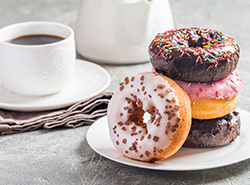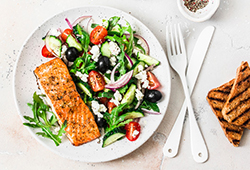
Jump to Supplement Suggestions»
Inflammation is an important and natural biological response to injury or infection. it’s a critical part of the body’s defence system. Sometimes, however, this intrinsic ‘alarm’ can spiral out of control, leading to chronic, low-grade inflammation that harms rather than heals.
More and more research suggests chronic inflammation is the root cause of many diseases.(1) In the words of Professor Tim Spector, a medical doctor and one of the top 100 most cited scientists, ‘nearly every disease is associated with some disorder of inflammation and considered a key part of ageing’.(2)
Thanks to widespread pollution and mass global production of plastics, microplastics – found in single use water bottles, storage wraps, and plastic containers – are ubiquitous in our modern world. These man-made materials can leech into the food supply, which may contribute to low-grade inflammation in the body.(3)
Pesticides are used on much of the produce we eat. However, these substances are toxic by design and intend to harm living organisms. Like microplastics, pesticides can migrate onto food. And their inherent toxicity may play a role in sustained, unresolved inflammation.(4)
Air pollution is another by-product of mass industrialization and development. Increasing scientific evidence suggests long-term exposure to pollution particulates can produce systemic inflammation in the body.(5)
Sleep is the cornerstone of good health. But many things rob us of our precious shuteye in the modern world. Sleep loss and the disruption of circadian rhythms (the body’s internal clock) increase inflammatory molecules.(6) And that’s why shift workers who have irregular sleep cycles, often have higher inflammatory markers.(7)

Visit our knowledge hub for more information on Sleep Health.
Cigarette smoking, nicotine, and excessive alcohol consumption are known to increase systemic inflammation in the body.(8)
Most inflammatory issues start in the gut, where the gut microbiome – the collective name for the trillions of bacteria, fungi, and viruses – resides. A typical Western diet, which is high in ultra-processed foods – often loaded with saturated fats and refined sugar – and low in fibre-rich foods (fruits, veggies and plants) can cause ‘dysbiosis’, an imbalance of good to bad gut bacteria.(9) Such disharmony and dysregulation can make the gut a more inflammatory environment.
Eating too much sugar can elevate blood glucose levels. In most healthy people, the body responds to sugar by secreting the hormone insulin, which helps restore blood glucose levels to normal. However, if you consistently have excessive glucose in your bloodstream – often down to overconsuming refined carbohydrates, sugary drinks, and other foods that spike glucose – your cells may become resistant to insulin, causing your overall blood sugar to rise. This state is known as insulin resistance – and it can trigger an inflammatory response in the body.(10)

Weight gain and inflammation have a bidirectional relationship: weight gain can lead to inflammation, and inflammation can lead to weight gain. One study reported the inflammatory marker, C-reactive protein (CRP), increased as weight increased.(11)
Never before have we been more virtually connected and less physically connected. But this isn’t how we evolved as a species. Humans are social beings. Therefore, isolation can become a source of stress, with research suggesting loneliness increases systemic inflammation.(12)
Stress, another epidemic of the 21st century, can also spike inflammatory markers.(13) Chronic stress over-activates the immune system, causing an imbalance of inflammation and anti-inflammation.
Food has the power to cause, prevent, and manage inflammation. There’s no specific ‘anti-inflammatory diet’ per se. ultimately, it comes down to not eating too much and avoiding ultra-processed foods.
Unlike ultra-processed products, whole foods are packed with anti-inflammatory properties. Eating a diverse range of plant foods, like vegetables, whole grains, legumes, nuts, seeds, and beans, as well as healthy fats and lean proteins, including oily fish and poultry, can help restore balance in the body. A varied, minimally processed diet may also support weight and blood sugar management, reducing inflammation even more.

Studies report that a plant-focused Mediterranean-style diet – rich in whole grains, vegetables, fruits, beans, and nuts – may reduce inflammation and prevent chronic health conditions.(14)
Scientists are now beginning to recognise that our bustling community of gut microbes plays an important role in immune function and inflammation. Gut imbalances – or dysbiosis – are known to increase inflammatory markers, so looking after your gut should always be a priority when tackling inflammation.(15)
Live cultures are made up of good bacteria that help the body work optimally. They remain a popular choice to support gut health.
Eating 30 different plant foods – fruit, vegetables, nuts, seeds, whole grains, legumes and beans – weekly is one of the best ways to cultivate an anti-inflammatory gut ecosystem.(16) These foods are rich in polyphenols and fibre, which feed your hungry gut microbes. Including more fermented foods, like kefir and kombucha, can also improve gut health.(17)
Poor blood sugar regulation and inflammation go hand in hand. Aside from eating more complex carbohydrates (think quinoa instead of white rice), reducing your sugar intake, and adding more dietary fibre – abundant in all plant foods – you may want to increase your chromium intake, which supports blood glucose maintenance. Brazil nuts, tomatoes, and egg yolks are great sources of chromium.
Washing your fruit and vegetables thoroughly before eating is vital to reduce pesticide exposure. If you have more time, you could soak your produce in apple cider vinegar for 20 minutes. Aim for 1 part vinegar to 4 parts water.
Some evidence suggests omega-3 fatty acids, EPA and DHA, may reduce inflammatory markers in the body.(18) Make a conscious effort to eat a mixture of foods high in omega-3s, including mackerel, salmon, chia seeds, flaxseeds, and walnuts. You may also wish to take a quality fish oil supplement or vegan alternative derived from plant-based microalgae to buffer levels.
Aromatic and fragrant, turmeric, garlic, and ginger have been used in traditional preparations for years. These spices are rich in active compounds – including curcumin in turmeric and allicin in garlic – that may have anti-inflammatory properties, so use them liberally when cooking.
References:
1)Furman, D., Campisi, J., Verdin, E. et al. (2019) Chronic inflammation in the etiology of disease across the life span. Nat Med 25, 1822–1832.
2)The truth about inflammation: All you need to know about 2023’s hottest health topic, from causes to cures (2023) The Guardian. Available at: https://www.theguardian .com/lifeandstyle/2023/jun/27/the-truth-about-inflammation-all-you-need-to-knowabout- 2023s-hottest-health-topic-from-causes-to-cures
3)Kwon JH, Kim JW, Pham TD, Tarafdar A, Hong S, Chun SH, Lee SH, Kang DY, Kim JY, Kim SB, Jung J. (2020) Microplastics in Food: A Review on Analytical Methods and Challenges. Int J Environ Res Public Health. 17(18):6710.
4)Ruíz-Arias, M.A., Medina-Díaz, I.M., Bernal-Hernández, Y.Y. et al. (2023) Hematological indices as indicators of inflammation induced by exposure to pesticides. Environ Sci Pollut Res 30, 19466–19476.
5)Pope, C.A. et al. (2016) ‘Exposure to fine particulate air pollution is associated with endothelial injury and systemic inflammation’, Circulation research, 119(11), 1204–1214.
6)Comas, M., Gordon, C.J., Oliver, B.G. et al. (2017) A circadian based inflammatory response – implications for respiratory disease and treatment. Sleep Science Practice 1, 18.
7)Bjorvatn B, Axelsson J, Pallesen S, Waage S, Vedaa Ø, Blytt KM, Buchvold HV, Moen BE, Thun E. (2020) The Association Between Shift Work and immunological Biomarkers in Nurses. Front Public Health. 8:415.
8)Federation of American Societies for Experimental Biology. (2016) "Missing link between smoking and inflammation identified." ScienceDaily. ScienceDaily.
9)Shi Z. (2019) Gut Microbiota: An Important Link between Western Diet and Chronic Diseases. Nutrients. 11(10):2287.
10)Collier B, Dossett L, May A, Diaz J. (2008) Glucose control and the inflammatory response. Nutrition in Clinical Practice. 23(1):3-15.
11)Tuomisto, K. et al. (2019) Role of inflammation markers in the prediction of weight gain and development of obesity in adults – a prospective study, Metabolism Open, 3, 100016.
12)Cruces, J. et al. (2014) ‘The effect of psychological stress and social isolation on neuro immunoendocrine communication’, Current Pharmaceutical Design, 20(29), 4608–4628.
13)Liu YZ, Wang YX, Jiang CL. (2017) Inflammation: The Common Pathway of Stress- Related Diseases. Front Hum Neurosci. 20; 11:316.
14)Gerber M, Hoffman R. (2015) The Mediterranean diet: health, science and society. Br J Nutr. 113 Suppl 2: S4-10.
15)Bolte, L.A. et al. (2021) ‘Long-term dietary patterns are associated with proinflammatory and anti-inflammatory features of the gut microbiome’, Gut, 70(7), 1287–1298.
16)Jones, P. (2023) Eating 30 plants per week: How to do it and why, Eating 30 Plants per Week: How To Do It and Why. Available at: https://joinzoe.com/learn/30- plants-per-week
17)Marco ML, Sanders ME, Gänzle M, Arrieta MC, Cotter PD, De Vuyst L, Hill C, Holzapfel W, Lebeer S, Merenstein D, Reid G, Wolfe BE, Hutkins R. The International Scientific Association for Probiotics and Prebiotics (ISAPP) consensus statement on fermented foods. Nat Rev Gastroenterol Hepatol. 18(3):196-208.
18)Simopoulos AP. (2002) Omega-3 fatty acids in inflammation and autoimmune diseases. J Am Coll Nutr. 21(6):495-505.






